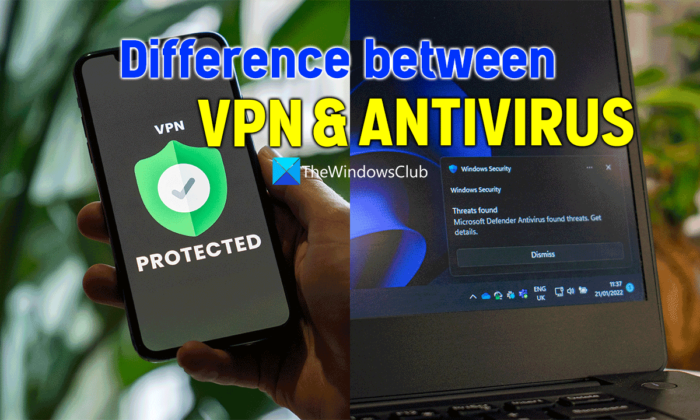You might have come across Virtual Private Network (VPN), Antivirus, Proxy, and more such technical jargon and wondered what they actually are and how are they different from each other. Each one has a specific function to do and they work to provide security to the user in their area. Have you ever wondered what actually is the difference between VPN and antivirus? In this beginners guide, we explain to you what they both are and the differences between them.

What is a VPN?
A Virtual Private Network or VPN shortly is a protective layer in the form of a program that is configured over a network using various internet protocols to protect the user from cyber threats. In simple words, a VPN protects the user from the threats that happen on the internet and protects the data, traffic and encrypts them, and passes them through a tunnel without giving a chance to anyone to fish it or look into it. It encrypts the users’ internet traffic and reroutes it through a VPN server.
The IP address, location, and data packets that pass from the internet and the user are secured and no one can access or look into them. A VPN keeps the user safe and private from trackers, hackers, Internet Service Providers, etc.
Read: Best free VPN software for Windows PC
What is antivirus?
As the name suggests, antivirus is a program that is developed to fight conflicting programs that carry malware or bad code which jeopardizes the device’s security. An antivirus will scan, spot, and block malware or viruses from infecting your devices. It only protects you from all kinds of threats like malware, virus, trojans, keyloggers, crypto hackers, adware, etc. They get updated daily on the new attacks and protect your PC with the new developments.
Read: Best Free AntiVirus software for Windows PC
What is the difference between VPN and Antivirus
The main differences between VPN and antivirus are mentioned below.
- Kind of security
- Firewalls
- Replace the personal IP address with a virtual IP address
- Data breach monitoring
- Parental controls
- Protection while accessing public networks
- Protection while downloading files
- PC or device health scan
An antivirus software secures your computer, whereas a VPN protects your privacy.
1] Kind of security
Both VPN and antivirus provide different kinds of security. VPN protects your internet data, whereas an antivirus protects you on the web browser while browsing data as well as secures your device from viruses, malware, etc.
2] Firewalls
Antivirus creates an advanced firewall on your device to protect your PC from unwanted threats. Whereas VPN is used to bypass firewalls and access restricted sites, and domains. In this aspect, antivirus still provides security and the VPN creates a ground to securely access restricted content.
3] Replace the personal IP address with a virtual IP address
Antivirus has nothing to do with the internet except for threat monitoring on web pages. But VPN replaces your personal IP address with a virtual IP address of the location you choose and secures you from trackers, hackers, ISPs, etc.
4] Data breach monitoring
Antivirus continuously is in action to protect your devices from external threats and actively monitors data breaches and gives you tips to secure yourself from them. A VPN has no such capability to secure you from data breaching except for encrypting your traffic and safeguarding your web activity.
5] Parental controls
You can set parental controls on your PC with an antivirus. It is not possible on the majority of VPNs to safeguard your child by setting parental controls.
Read: How to set Parental Control in Chrome, Edge, Firefox, Opera
6] Protection while accessing public networks
VPN has all the capabilities to create a safe environment for your internet traffic while accessing public networks. It gives you complete protection from unwanted threats like hacking through public Wi-Fi. Antivirus is always the same and if it detects any unwanted threat incoming, it will block it and safeguard your device.
7] Protection while downloading files
You can download files safely from the internet through various ways like torrents, etc safely using a VPN. It encrypts the data packets that move between the networks. The antivirus scans those downloads to spot any threats and delete them.
8] PC or device health scan
Antivirus actively monitors the health of your device by scanning, spotting, and removing threats. A VPN does not have such capabilities. It only works when you enable it to access the internet.
These are the different ways a VPN differs from an antivirus. They both are different in their strengths and both together can give the best protection from almost every threat on your device.
Is VPN better than antivirus?
VPN and antivirus, both have different functions and purposes. They are never better than one another as they are not comparable. VPN encrypts and secures your internet whereas antivirus protects your devices from various threats.
Leave a Reply